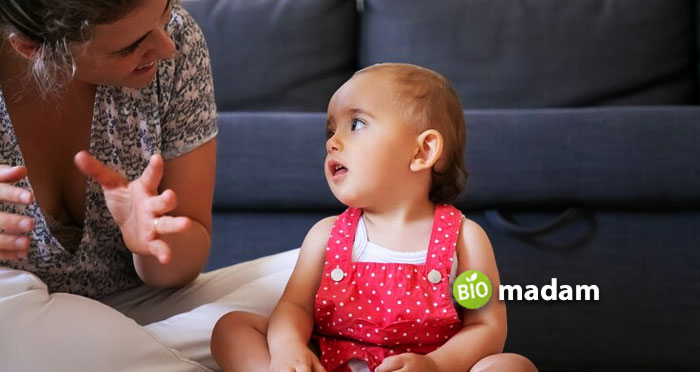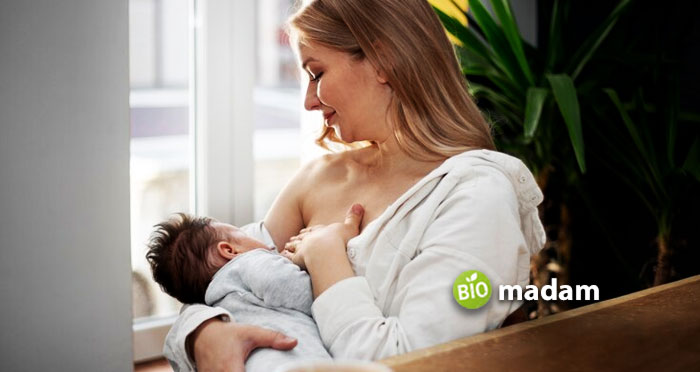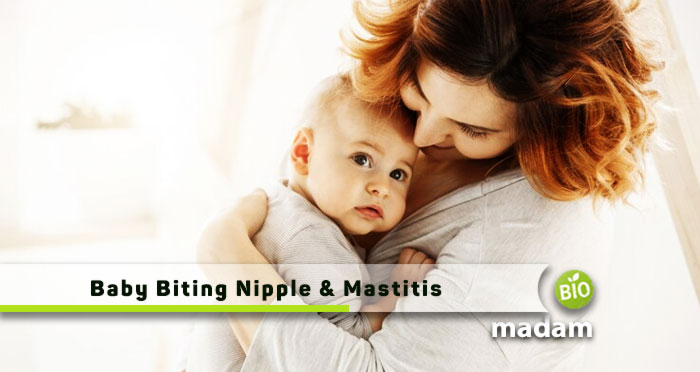Breastfeeding, a fundamental aspect of early motherhood, is a profoundly enriching experience. However, amidst the joy it brings, it’s important to address some of the challenges that can arise. One such challenge is mastitis, a painful condition that affects breastfeeding mothers. But what role does a baby’s biting play in potentially causing mastitis?
In this exploration, we venture into the intricate dynamics between infant behavior and maternal health. We aim to dissect the connection between baby biting and mastitis, unraveling the subtleties and exploring preventive measures and management strategies. By gaining insights into this issue, we empower mothers with valuable knowledge, enabling them to navigate breastfeeding confidently and mitigate the risks associated with mastitis.
What is Mastitis?
Mastitis is an inflammation of breast tissue that often results in breast pain, swelling, warmth, and redness. It can make a mother feel generally unwell, with symptoms like fever and chills. This condition can be caused by various factors, including bacterial infections, milk stagnation, blocked milk ducts, cracked or damaged nipples, and poor latch and positioning during breastfeeding.
Baby’s Biting Behavior

Babies often go through phases where they may bite the nipple during breastfeeding. This behavior can be concerning for mothers and may lead them to wonder whether it contributes to mastitis. It’s important to note that babies bite for various reasons. Sometimes it’s due to teething discomfort, curiosity, or simply as a way to communicate.
The Relationship Between Baby’s Biting and Mastitis
The question that arises is whether baby biting can directly cause mastitis. The answer is not straightforward. While baby biting can be painful and potentially lead to nipple damage, it’s not a direct cause of mastitis. Mastitis is primarily caused by bacterial infections or other factors like blocked milk ducts.
However, there is an indirect connection between baby biting and mastitis. When a baby bites the nipple, it can lead to nipple damage, which in turn can create an entry point for bacteria to enter the breast tissue. Additionally, if a mother experiences nipple pain due to biting, she might not empty her breasts properly during feeds, which can result in milk stagnation and an increased risk of mastitis.
What Other Infections are Caused by Baby Biting Nipple?
Aside from mastitis, biting can potentially cause other nipple and breast-related issues, such as:
Nipple Cracks
Nipple cracks, and painful fissures in the nipple’s skin, can result from improper baby latching or biting. While not a direct consequence of biting, these cracks can worsen due to the pressure and friction created during feeding, increasing the risk of infection. Prompt care and treatment are vital to address these cracks effectively.
Open Wounds
Open wounds, deeper and often bleeding injuries to the nipple, can occur when a baby bites forcefully. These wounds are more susceptible to infection compared to surface cracks, making proper wound care and infection prevention crucial for mothers experiencing this issue.
Bacterial Infections
Bacterial infections can develop when bacteria, often from the baby’s mouth, enter the breast tissue through nipple cracks or wounds. Recognizable signs include increased pain, redness, warmth, swelling, and nipple discharge. Early detection is key to prompt treatment with antibiotics prescribed by a healthcare professional.
Fungal Infections (e.g., Thrush)
Fungal infections, like thrush, can thrive when the yeast balance is disrupted in both the baby’s mouth and the mother’s breast. Though not directly linked to biting, nipple damage can create an environment conducive to yeast overgrowth. Thrush manifests as persistent nipple pain, burning, itching, and white patches in the baby’s mouth. Effective resolution involves antifungal medications for both mother and baby, emphasizing the importance of early recognition and intervention.

Prevention and Management
To reduce the risk of mastitis and related infections due to baby biting, consider the following strategies:
- Correct Latch: Ensure your baby has a proper latch onto the breast. Seek guidance from a lactation consultant if needed.
- Monitor Feeding: Pay attention to your baby’s feeding cues and unlatch them if they start to bite. This helps prevent nipple damage.
- Teething Relief: If your baby is teething, offer them teething toys or a chilled washcloth to alleviate discomfort.
- Proper Nipple Care: Keep your nipples clean and dry. Apply a lanolin-based cream to soothe and protect them.
- Express Milk: If your baby’s biting is causing too much pain, consider expressing milk and feeding it to your baby via a bottle or cup temporarily.
Conclusion
While baby biting is not a direct cause of mastitis, it can indirectly contribute to the condition by causing nipple damage and potential entry points for infection. It’s essential for breastfeeding mothers to be aware of this connection and take steps to prevent nipple damage, seek professional help when needed, and ensure a positive breastfeeding experience for both themselves and their babies. With the right knowledge and support, breastfeeding can be a fulfilling and healthy experience for both mother and child.

People call me Domonique Smith in Ross! I was always fond of helping people, so opted an MBBS degree to pursue my passion as my career. My major interests fall in dealing with pregnant ladies and helping them in the best of my wills for their comfort. I am further planning to choose Gynecology as my major, so wish me luck!

